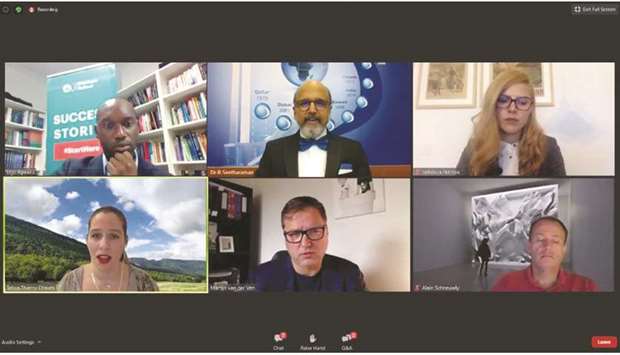Doha Bank CEO Dr R Seetharaman participated in a webinar hosted yesterday by the European University. The webinar carried the theme ‘A Modern-Day Catalyst for Change: Navigating Business, Trade, and Interaction Post Pandemic’.
During the webinar, Seetharaman gave insight on technology and customer trends that were affected by Covid-19. He said digital acceleration, remote working, and activation of business continuity plans “are some of the developments” due to Covid-19.
“The customer experience management, real time offers, individualisation, service offering, and digital as a primary channel are some of the key areas of focus to provide value to customers. The pillars of business transformation include digital, IT, workforce, and security.
“The needs of business transformation include revenue growth, customer experience, cost reduction, and enhanced efficiency with initiatives focusing on financial marketplace, digital channels, tailored products, risk management, digital process, modern branches, and workspace leveraging on technologies, such as APIs, data analytics, blockchain, and mobility solutions,” Seetharaman said.
On future of work, Seetharaman said: “Technology will augment people’s jobs. Artificial intelligence algorithms and intelligent machines will be co-workers to humans. Today, smart technology drives smartphones, smart cars, smart homes, smart grids, smart infrastructure, smart cities, and the like.
“As the smart ecosystem continues to expand, we must consider where smart technology is taking nations and what the smart future will look like for each nation’s ecosystem. For each country, it is essential to evaluate how will cognitive computing, computer vision, voice ecosystem, robots, 5G, AI, and big data promote and shape smart behaviour and futures in its smart ecosystem.”
Seetharaman also gave insight on the global economy. He said the IMF reported on October 2020 that global growth is projected at −4.4% this year, while global growth is projected at 5.2% in 2021.
“Growth in the advanced economy group is projected at –5.8% in 2020. In 2021, the advanced economy growth rate is projected to strengthen to 3.9%. Among emerging markets and developing economies, growth is forecast at –3.3% in 2020, strengthening to 6% in 2021.
“In a September 2020 meeting, the US Fed stated that it will aim to achieve inflation moderately above 2% for some time, so that inflation averages 2% over time and longer-term inflation expectations remain well-anchored at 2%,” Seetharaman said. On global trade, Seetharaman said: “The WTO now forecasts a 9.2% decline in the volume of world merchandise trade for 2020, followed by a 7.2% rise in 2021. Strong trade performance in June and July have brought some signs of optimism for overall trade growth in 2020.
“Downside risks still predominate, particularly if there is resurgence of Covid-19 cases in the coming months. Covid-19 brought about new consumer habits, risk-mitigation, business strategies, and government emergency measures that resulted in an unprecedented dislocation of international trade and supply chains.”

During the webinar, Seetharaman said digital acceleration, remote working, and activation of business continuity plans u201care some of the developmentsu201d due to Covid-19.
